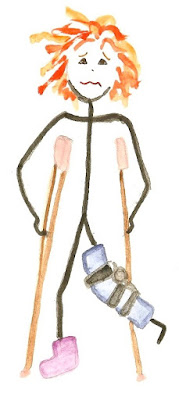Baby steps.
Little by little I may reenter society.
The problem when you feel despair – a “dark night of the soul” – is that you can still interact with people, but when you do, you pull out some ebullience, some pep, because otherwise you’re just a black hole. A Debbie Downer. But then you feel like a fake (not to mention that you can get a little manic in the overcompensation and that’s a whole other alarm). And if you want to be authentic in your interactions with friends, then you’re not presenting properly. You’re presenting positive energy, and that’s not what you have. Other people see a person, but you are just a shattered pile of pieces.
And because there’s Zoom, you can still appear to be interacting and not missing out on book club or theater group, but that’s because the machine protects you. Maybe people are not doing Gallery View and so they don’t see you. You can always Stop Video.
I wear contact lenses. When I was younger, I noticed that when I wore glasses, I felt like no one could see me. A barrier had gone up around my eyes that shielded me. When I wear a mask, the same thing happens. I get to walk around like the Invisible Woman.
And when the adult daughter spent December with us, my world just moved into our living room. When the temperatures hung out well below zero, I didn’t go out.
So this perfect storm of fakery-avoidance and machines and barriers and home and below zero just allowed me to isolate. And isolate. Even now, I’m not sure how to stop it. It makes many things much easier: less planning, less arranging, less energy required.
I do two things: I read a lot, and I do jigsaw puzzles. Jigsaw puzzles are disorder assembled into order. That is all they have to do, and I cannot say enough good things about jigsaw puzzles.
2021 traumatized me. No, it traumatized me. No, more accurately, it traumatized me. It started with January 6 and watching our legislators have to run and cower for their lives. And it continued with watching some of those same legislators later deny the severity of what happened, watching an entire Republican Party cower to the megalomania of a demagogue.
Then I watched our Supreme Court decide they could control women’s bodies. More recently, they decided it was discrimination to try and reverse discrimination. In Anchorage, I saw our mayor dismantle homeless shelters, close Covid testing sites, even mess with our library. My library! My most prized institution in the world!
Oh, I’ve organized Zoom calls with my senators, email and phone my legislators repeatedly, prepare testimony, teach English to refugees and immigrants, donate to worthy causes; but our democracy is in danger, and all I am is some ineffectual Paul Revere shouting in the wilderness.
The only communication possible became a rant. Or despair. Both socially unacceptable.
I told Tim I was trapped in this world, that if I were an animal I would try to chew off my arm to escape.
So he took me to Mexico, to daylight and warmth and water and beaches. It has saved my psyche every year, and it did again. I have a dopey, leaky yellow plastic raft that can barely stay afloat. And unlike a boogie board, the limp, leaky raft doesn’t keep you on top of the wave. It lets the wave pummel you, flip you up from down, smash you into the sand. You emerge with a scalp full of sand, a bathing suit full of sand, and a shriek of being alive. I laughed out loud. That sound actually came from me. I heard it.
But what really saved me in Mexico was respect. In the restaurant, people would enter with a mask, hang it on the little hook by their table while they ate, and put it back on when they got up. I felt like they cared about the health of their community, about each other. They passed laws to protect themselves and others.
So now I’m back home, and Putin is on the border of Ukraine and I had a dream that nuclear war happened and Sophie cried that she’d thought she’d have her whole life ahead of her and my heart just broke, and this is how my head is working and I just don’t know how to walk around like this in front of other people.
So now you know.
Every now and then, a warm and funny thing happens, and I want to write about it. I imagine the structure it will take – the beginning, the middle, and the end – and it’s a good story. Maybe I will write about it tomorrow.



















































